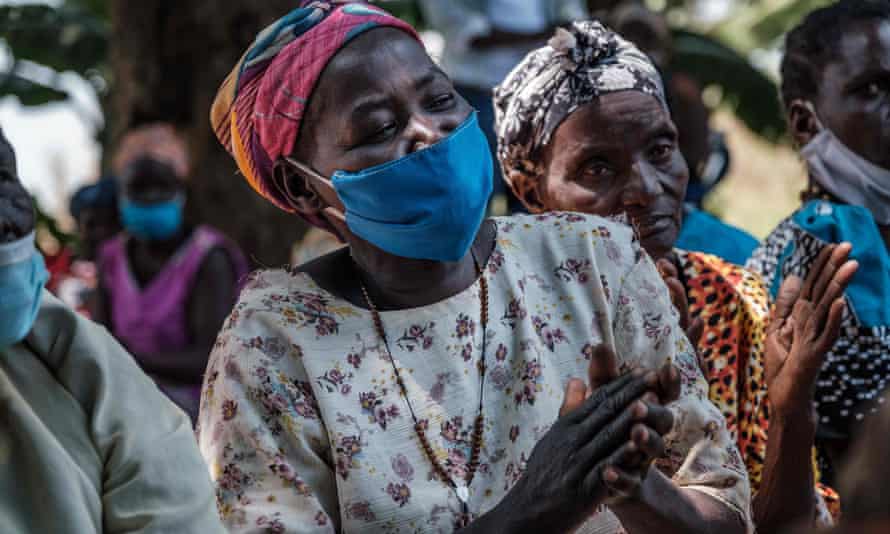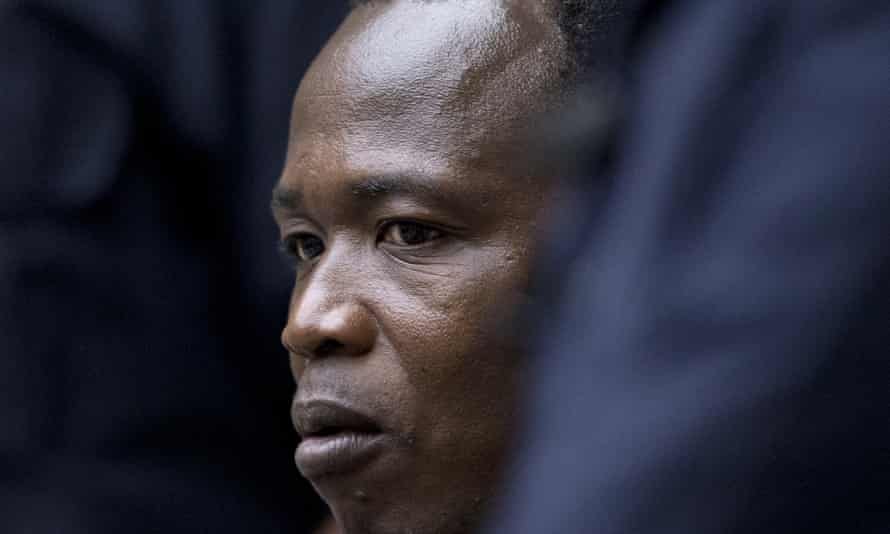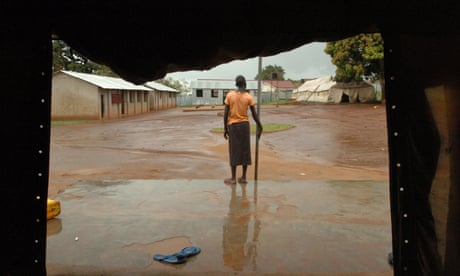
A former militia leader and child soldier from Uganda has been found guilty of war crimes and crimes against humanity at the international criminal court in a landmark judgment.
Dominic Ongwen was convicted on Thursday of 61 individual charges of murder, rape, sexual slavery, abduction and torture committed as a commander in the Lord’s Resistance Army (LRA), a violent cult which waged a bloody campaign of violence in Uganda and neighbouring countries from the mid-1980s until a few years ago.
In his first appearance in December 2016, Ongwen said he would plead not guilty, telling the court he was “one of the people against whom the LRA committed atrocities” and should not be on trial.
Lawyers for Ongwen also argued that he had been profoundly traumatised during his time with the group and so was not responsible for his actions.
The presiding judge, Bertram Schmitt, said a huge number of witnesses had provided overwhelming evidence that painted a picture of a person in full possession of his abilities.

Ongwen was described as an extremely capable fighter and commander who planned attacks carefully and assessed risks, was repeatedly praised by other commanders, who did not face threat of death or serious harm if he disobeyed orders, and who did not take many opportunities to leave the LRA but rather rose in rank and position, Schmitt said.
Ongwen sat impassively through the lengthy verdict, and did not react as the names of many of his victims were read out.
He is likely to be sentenced to many decades in prison.
The trial has been one of the most momentous in the ICC’s 18-year history, and the tribunal’s decision will have a significant impact on future prosecutions for crimes against humanity, experts say.
Led by Joseph Kony, who claimed to be religiously inspired, the LRA waged war across five countries in east and central Africa. The group relied on the abduction of largely defenceless villagers and refugees, including children, to provide labour and combatants.
Girls were forced into sexual and domestic slavery while boys were forced to take up arms.
Most of the charges against Ongwen focus on attacks on refugee camps between 2002 and 2005. One of the worst involved a four-day raid by the LRA on camps in the Democratic Republic of the Congo in December 2009, in which about 350 civilians were killed and another 250, including at least 80 children, were abducted.
“He was not a puppet on a string,” Schmitt said.
The verdict also described how Ongwen, the first child soldier to appear before the ICC, had himself “abducted innumerable children under 15 years of age and forced them to serve as fighters”.
The children were regularly severely beaten and forced to witness killings before being trained in fighting skills. Recruits were not taught to distinguish between civilians or combatants, and many were killed during operations commanded by Ongwen, who told one witness: “You call those kids children, I call them my soldiers.”
The court also heard harrowing testimony of how young women who had been abducted by the LRA were threatened with execution if they refused to become “the wife” of a commander.
“Sexual intercourse was regularly forced on women and girls at a very young age. The women and girls were unable to resist … the physical force and threat of punishment and their dependence on the leaders in the bush,” Schmitt said.
“I did not want to be with him … I was too young,” one told the court.
“He was the commander … If I refused I would be killed,” another witness said. “I all the time saw girls who made mistakes being killed. I was very scared.”
Abducted woman and girls were used as domestic servants, enforced by physical punishments, suffering “barely imaginable physical and mental pain”, Schmitt said.
Of the five senior LRA leaders indicted by the ICC more than a decade ago, only Ongwen and Kony are still alive. Despite a $5m (£3.5m) reward for information leading to his capture, Kony remains elusive.
Joseph Akweyu Manoba, a Ugandan lawyer appointed by the ICC to represent 1,500 of Ongwen’s victims, told the Guardian at the start of the trial that not one of them believed Ongwen was himself a victim.
But the reaction of some victims of the LRA underlined the complexity of the case, raising difficult issues of blame and responsibility.
In Gulu, hundreds crowded into St Monica’s church hall to follow proceedings in The Hague. After watching in silence, many appeared upset by the verdict.
Joyce Alimoncan, who was abducted by the LRA from her home in Pade when she was 10, spent years in the bush with Ongwen and a commander she was forced to marry at the age of 13.
“Ongwen is not a bad person. He was just kidnapped as a child like all of us and the circumstances made him this way. Today I feel broken,” Alimoncan, 29, said.
Evelyn, 38, returned to her home in Gulu in 2005 after being held by the LRA for 11 years. She became a “wife” at 14 and gave birth to three children while with the group.
Grace Adong, who spent 12 years in the bush and was in the same brigade as Ongwen, said he was a scapegoat.
“He was … the kind of person Kony would select to grow since he was easy to train. I listened carefully to the judgment but many of the crimes were not committed by him. Ongwen was just a commander of a battalion but [the crimes committed] were ordered by the brigade commander so why is he not convicted?” Adong said.
Others were less sympathetic. Grace Acan, who was abducted by the LRA as a teenage girl when the rebel fighters broke into a dormitory in a girls school, said that even if Ongwen was jailed he would be in a better position than many of his victims.
“It doesn’t make me feel happy at all. Looking at the gravity of the crimes and atrocities he committed, what happens to those people he offended? My justice will be to see the lives of the victims changed [for the better],” Acan said.
Vincent Oyet, a teacher whose relatives were killed in an attack led by Ongwen on an IDP camp in northern Uganda, said he welcomed the guilty verdict.
“As victims, we have been waiting for this time since Ongwen was taken to the court ... I lost all my property during the attack. The property was burnt during the attack. My relatives, my niece, neighbours and clan-mates were killed, “ Oyet said.
Analysts in Uganda said the judgment was important because it suggested progress towards ending impunity in a country with a long history of conflict.
“The world is watching. While justice might be slow, it eventually comes. It was very important that Ogwen was found guilty so that we can begin the process of reparations, said Dr Brian Kalenge, a lecturer at the faculty of law at Uganda Christian University.
The case is important for the embattled ICC, which was founded in 2002 to bring to justice perpetrators of crimes that local criminal systems cannot deal with. The court has a staff of nearly 1,000 and an annual budget of more than $180m (£130m) but has struggled to secure convictions in a series of high-profile cases.


No comments:
Post a Comment